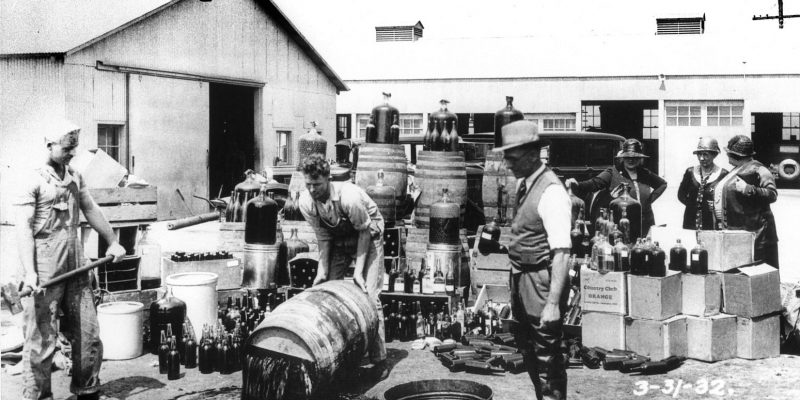This blog post is one in a series of planned stories about U.S. Government misdeeds. When I told a friend about my plan for this one, “U.S. Government Poisons Its Own Citizens,”* she wisely pointed out that some readers would not object in the least to what I will report here.
Libertarians famously despise Big Government and its many crimes. But the truth is that we have the government that the majority of our citizens want, as evil as it is. Her comment is an important reminder for me that the enemy of freedom is not, primarily, our government. The enemy of freedom is an immoral majority of citizens willing to sanction the use of government force, not to protect themselves from the initiation of force or fraud, but in order to impose their collective (mostly arbitrary) will upon others who have different opinions how to lead their lives.
The task for Libertarians, then, is to teach history and ethics, and to provide a moral example for our fellow citizens. So let us, in this post, inform our fellow citizens about an ugly historical fact.
While little history is taught these days in government schools, most adults have an inkling that American had an experiment in forbidding the manufacture, sale, and transportation of alcoholic beverages, a period of our history called “Prohibition.”
The Eighteenth Amendment to the United State Constitution was ratified by enough states on January 19, 1919. Forty-six states ultimately ratified the amendment. The amendment was repealed by the Twenty-First Amendment on December 5, 1933, almost 15 years later. The important point to emphasize is that a majority of our citizens and their representatives in government approved Prohibition.
Section 1. After one year from the ratification of this article the manufacture, sale, or transportation of intoxicating liquors within, the importation thereof into, or the exportation thereof from the United States and all the territory subject to the jurisdiction thereof for beverage purposes is hereby prohibited.
In response to the amendment the Volstead Act established prohibition effective January 17, 1920.
The most memorable consequence of Prohibition is certainly the rise of organized crime, symbolized by Chicago’s notorious crime boss Al Capone whose reign ended upon his imprisonment in Atlanta, Georgia, for tax crimes in May 1932, about six months prior to the repeal of the Eighteenth Amendment.
A largely forgotten consequence of Prohibition was the murderous policy of the U.S. Treasury Department to poison industrial alcohol, which was used to make bootleg liquor, in order to deter American consumers from drinking it. The government required manufacturers of industrial alcohol to add methyl alcohol, also called wood alcohol, and other poisons. According to an article by Deborah Blum in Slate, February 19, 2010, around 10,000 Americans died from the government poisoning of industrial alcohol.
In a Snopes.com response to the claim about government poisoning, the writers conclude: “The government … did [not] intentionally aim to kill those who drank the tainted products.” Snopes does admit, though, that U.S. government “regulatory agencies encouraged measures making industrial alcohol undrinkable, including the addition of lethal chemicals.” (Emphasis supplied.) The use of the word “encouraged” is false and misleading. The government ordered manufacturers to poison industrial alcohol.
Such apologetics are common in response to government atrocities, federal, state, and local. A common Libertarian claim is that “there is no crime so trivial that its violation might not result in the death penalty.” A particularly egregious example is the killing of Eric Garner by police in New York City, Staten Island, for selling loose cigarettes on July 17, 2014. No officers were prosecuted, though the choke hold violated police department policy. One of the officers involved was fired on August 19, 2019, more than five years after Eric Garner’s death.
The Libertarian point is that the government’s presence in the causal chain of death at any point is a moral problem. The government had no business engaging in Prohibition. Poisoning an element in the supply chain of illegal bootleg liquor was a moral crime that resulted in the deaths of thousands. The deaths were foreseeable and were foreseen. One need not be a mind reader to know that.
Part of being a Libertarian is understanding that the Non-Aggression Principle (the “NAP”) is a moral principle. Individuals and governments acting on their behalf do not have the moral right to legislate that which consenting adults consume.
Here ends the moral lesson.
*editor’s note: this title and topic, while important, is not singular. It could as easily be titled, ‘One of the times the U.S. Government poisoned its own citizens.’ Readers are encouraged to discover CIA’s “Project MK Ultra,” Willowbrook experiments, Stateville Penitentiary Malaria Study, Navy Beef Blood Transfusions, Operation Sea-Spray, and FDA’s AIDS experiments on foster children, among others.

